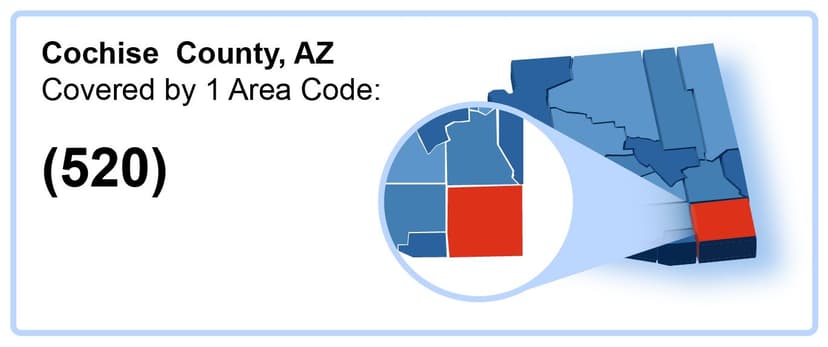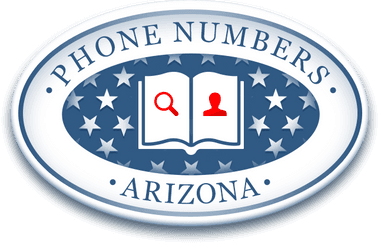What are Cochise County Area Codes?

Every geographical area under the North American Numbering Plan (NANP) is grouped into Numbering Plan Areas (NPAs). These NPAs have specific three-digit numbers known as area codes assigned to each of them. An area code is a three-digit code that identifies the originating location or destination of a call. It appears at the beginning of a ten-digit telephone number, making it possible for a resident to determine a call’s origin. An area code lookup can be conducted using a reverse phone lookup tool to identify the geographical location that an unfamiliar area code represents.
Area Code 520
Area code 520 became active on March 19, 1995, and was created from area code 602. It was split on June 23, 2001, to form area code 928, but it still solely covers Cochise County. Area code 520 covers most of southeastern Arizona. The cities the area code serves include Benson, Tucson, Casas Adobes, Maricopa, Catalina Foothills, Casa Grande, Sierra Vista, etc.
What are the Best Cell Phone Plans in Cochise County?
Verizon, T-Mobile, Sprint, and AT&T provide reasonable network coverage in Cochise County. Among these four major phone networks covering Cochise County, Verizon offers the best coverage with 92%. T-Mobile is the second-best with 82% coverage, and Sprint follows with 66% coverage. AT&T has the least network coverage with 62%. Generally, factors like bad weather and population density may adversely influence the quality of the network in the county.
The National Center of Health Statistical Survey published in 2018 shows that adults and minors in Arizona mostly use only wireless telephones instead of landlines. The survey reveals that an estimate of 64.9% of the Arizona adult population used only wireless telephones, while an estimate of 3.3% of the Arizona adult population used only landlines. In comparison to the telephone status survey of minors, an estimate of 75.7% of the Arizona population of minors used only wireless telephones, while just 1.2% of Arizona minors used only landlines.
Cochise County residents are fast porting from traditional telephony technology to VoIP. VoIP means Voice over Internet Protocol. It refers to a technology that enables voice and multimedia communications over an internet connection. Businesses in Cochise County mostly prefer to use VoIP because of its exceptional features that enhance the scalability of businesses. With VoIP, businesses and residents can enjoy numerous features at reasonable costs. VoIP services are available at different subscription costs. The services are versatile and cost-effective. Some exceptional features of VoIP are Caller ID spoofing, conference calling, call recording/monitoring, call screening, automated attendant, call forwarding/voicemail, etc.
What are Cochise County Phone Scams?
Cochise County phone scams involve scammers preying on unsuspecting Cochise County residents to defraud them over the phone. They devise fraudulent schemes to steal residents’ hard-earned money and personal information. The scammers use impersonation and deceit to gain the trust of Cochise County residents and then swindle them. In recent times, scammers have begun to maximize the use of technological innovations like Caller ID spoofing and robocalls to facilitate their acts of deceit. These scammers use Caller ID spoofing to conceal their true identities and take on the Caller IDs of the entities they intend to impersonate. These entities may be government agencies like the IRS, Social Security Administration, law enforcement agencies, health institutions, etc. Scammers also impersonate legitimate businesses in the county and family and friends of their targets.
The Federal Communications Commission (FCC) and Federal Trade Commission (FTC) help create awareness on illegal Caller ID spoofing and phone scams. These government agencies also help educate residents on how to activate call-blocking tools and features. There are also free reverse phone lookup services that help unravel the callers behind scam calls by answering the questions, “who is this number registered to? or who called me?”
Commonly perpetrated phone scams in Cochise County are:
What are Cochise County Sprint Robocall Scams?
The Sprint robocall scam involves a robocall from a scammer claiming to be calling from Sprint and offering a gift card. The scammer then requests that you first give up your social security account details. Persons that receive such calls should make sure not to give out any personal information, including their social security numbers because such calls are from scams. These scams are rampant in Cochise County as scammers easily send the robocalls randomly using auto-dialers. Residents should be wary of such and use reverse phone number lookup tools to conduct phone number searches. With these tools, they can uncover the identity of scammers.
What are Cochise County Loved One in Danger Scams?
As the name implies, these scams involve scammers contacting residents to tell them that their loved ones, either family or friends, are in danger. The danger may be a fake kidnap requiring ransom, a fake accident requiring hospital bills, or a police case requiring attorney fees or bail. Usually, scammers in these scams request that the recipients make immediate payment while they are on the phone. They also insist on receiving money before the recipients are allowed to hang up. The scammers may enhance the believability of the scam by getting someone to cry or make some emotional sounds in the background.
Residents should be wary of such scams and carry out free reverse phone number lookups to determine who called them.
What are Cochise County Outstanding Warrant Scams?
Cochise County outstanding warrant scams involve scammers posing as the members of the Cochise County Sheriff’s Office (CCSO). In doing this, they conceal their Caller IDs and copy that of the CCSO to extort money from residents or fraudulently obtain their personal information. These scammers make their targets believe they have outstanding warrants in their names. They demand that payment be made by gift cards, prepaid debit cards, wire transfers, etc. to avoid arrest.
The CCSO warns of these scams, informing Cochise County residents that the Sheriff’s Office does not contact residents to negotiate arrests by demanding payment. Residents are advised to hang up such calls immediately and report them to the CCSO. Reverse cell phone lookup tools can help identify spoofed Caller IDs and determine unfamiliar callers’ identities.
What are Cochise County Social Security Administration Scams?
In these scams, Cochise County residents receive calls from phone numbers with “SSI” as the Caller ID. The callers claim to be from the Social Security Administration and tell the recipients that their social security numbers have been suspended due to suspicious activities. In some cases, the callers may have noticeable “Indian or middle eastern accents,” which indicates that the call is a scam.
Residents should immediately hang up because the Social Security Administration does not contact residents in such a manner. The Social Security Administration educates residents on how to identify SSA scams and protect themselves from them. Victims of these calls can report to the Inspector General’s Office or the Social Security Administration online.
What are Robocalls and Spam Calls?
Robocalls are automated calls that transmit pre-recorded messages to many people using auto-dialing systems. Robocalls were primarily designed for the dissemination of information to create awareness or make emergency announcements. Hence, they are mostly used by political parties, telemarketers, and some government agencies. However, scammers also exploit robocalls and use them to defraud residents. While robocalls are mainly informational, some contain instructions for recipients to press certain numbers to unsubscribe from the calls or speak with live representatives. These types of robocalls are likely fraudulent as the prompts may lead the recipients to be scammed.
In 1991, the Federal Communications Commission (FCC) came up with the Telephone Consumer Protection Act (TCPA) in a bid to regulate the use of robocalls. Under this Act, individuals must first obtain the written consent of their target audience before sending robocalls to them. Robocalls sent without prior consent are considered illegal, and the recipients can file complaints to report the calls. Despite the TCPA, the Federal Trade Commission (FTC) authorizes some robocalls to be sent to residents without prior consent. They include:
- Robocalls for political campaigns
- Robocalls for debt collection
- Robocalls by legitimate health institutions
- Purely informational robocalls
- Robocalls by charitable organizations
Similar to unsolicited robocalls, spam calls are considered annoying. They are unwanted calls sent out massively to transmit irrelevant information to recipients, without their permission. Individuals can use reverse phone lookup free to spot and block these calls
Residents can take these measures to combat robocalls:
- Terminate the call immediately if you unknowingly pick a robocall and ignore the instructions given during the call.
- Do not engage with the call. If the robocaller asks, “can you hear me?” or asks a question that requires you to answer yes or no, terminate the call immediately. The aim is to get a “yes” answer, which will be used to access personal info from you or place orders that you did not approve.
- Utilize a good reverse phone lookup tool to flag and block robocalls. Most phones have in-built call-blocking features, which can also be used to block phone numbers. On the other hand, contact your telephone service provider for call-blocking options.
- Register all your personal phone numbers on the National Do Not Call Registry to minimize robocalls. The registration will take full effect 31 days.
- File a report of all complaints on robocalls to the FTC through the online complaint assistant or call 1-888-382-1222.
How to Spot and Report Cochise County Phone Scams?
The evolving nature of phone scams has constituted a major problem for Cochise County residents, making it difficult to eradicate them completely. Notwithstanding, residents can avoid falling victim to scams by being vigilant of their red flags, which are:
- Requests for sensitive personal and financial information, such as account number, date of birth, mother’s maiden name, social security number, etc. Be careful not to disclose personal information over the phone as legitimate entities never demand such information.
- Demands for advance fee payment for fake winnings. Hang up from such calls immediately and conduct a suspicious phone number lookup to verify the call.
- Payment demands via gift cards, wire transfers, bitcoins, etc. Ignore such demands as payment through any of these means are untraceable or irretrievable.
- Threats to deport, arrest, and revoke residents’ license to ensure compliance. Contact the impersonated entity directly on their website or through to their official number.
- Calls requesting nondisclosure to a third party. Hang up on such calls and conduct free reverse phone number lookups to identify who called
- Payment demands for the retrieval of money lost to scams.
- Calls with a sense of urgency, pressuring the recipient to make immediate decisions.
Residents of Cochise County can contact any of these government agencies to report scams:
Cochise County Sheriff’s Office - The Sheriff’s Office provides regular updates on trending phone scams in the county through its social media platforms. Residents can report using the contact details below:
205 North Judd Drive
MilePost 345, Highway 80
Bisbee, AZ 85603
(520) 432-9500 or (800) 362-0812
Or
Region 1 - Bisbee Substation
205 North Judd Drive
Bisbee, AZ 85603
(520) 432-9500
Arizona Consumer Protection Division of the Attorney General’s Office - File a complaint to the department to report phone scams, using the department’s contact information:
Consumer Information and Complaints
1275 W. Washington
Phoenix, Arizona 85007-2926
Phone: 602-542-5763 or 800-352-8431 (toll free)
Fax: Fax 602-542-4085
Email: consumerinfo@azag.gov
Federal Trade Commission - Individuals that receive scam calls can report via the online consumer complaint assistant. In addition, register your phone numbers on the FTC’s National Do Not Call Registry to reduce unwanted calls.
Federal Communications Commission - Individuals that receive scam calls such as unsolicited robocalls, Caller ID spoofing, and identity theft can report by completing the online complaint form or calling the FCC on 1-877-382-4357.
